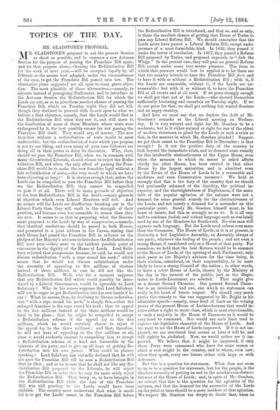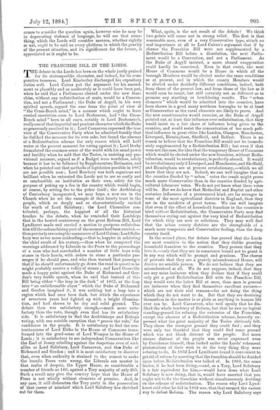TOPICS OF THE DAY.
MR. GLADSTONE'S PROPOSAL.
MR. GLADSTONE'S proposal to cut the present Session as short as possible, and to summon a new Autumn Session for the purpose of passing the Franchise Bill again, and for that purpose alone,—leaving the Redistribution Bill for the work of next year,—will be accepted loyally by all Liberals as the means best adapted, under the circumstances of the case, to get the Franchise Bill passed into law. The alternative plans suggested are all open to some grave objec- tion. The most plausible of these alternatives,—namely, to adjourn instead of proroguing Parliament, and to introduce in the Autumn Session the Redistribution Bill for which the Lords cry out, so as to give them another chance of passing the Franchise Bill, which on Tuesday night they did not kill, though they declined to proceed with it,—is open to what we believe a final objection, namely, that the Lords would find in the Redistribution Bill when they saw it, and still more in the disaffection of some of those Members whose seats were endangered by it, the best possible excuse for not passing the Franchise Bill itself. They would say, of course, The new franchise without a redistribution of seats would be most undesirable ; but the redistribution of seats which you propose is not to our liking, and even many of your own followers are doing all in their power to delay its discussion. Why, then, should we pass the Franchise Bill, when we, in common with many discontented Liberals, should choose to reject the Redis- tribution Bill, and when the only effect of passing the Fran- chise Bill would be to make the new franchise legal without a fair redistribution of seats,—the very result to which we have been objecting so long ?' It is obvious enough that, unless the Lords can be compelled to pass the Franchise Bill before they see the Redistribution Bill, they cannot be compelled to pass it at all. There will be many grounds of objection to the best Redistribution Bill in the world,—many grounds of objection which even Liberal Members will feel. And no sooner will the Lords see disaffection breaking out in the Liberal Party than they will exult in the strength of their position, and become even less amenable to reason than they are now. It seems to us that in proposing what the Govern- ment proposed to the Lords by way of compromise,—namely, that identical resolutions should be passed in both Houses, and presented in a joint address to the Crown, stating that each House had passed the Franchise Bill in reliance on the pledges of her Majesty's advisers to introduce the Redistribution Bill next year, —they went to the furthest possible point of concession to the dignity of the House of Lords. Lord Salis- bury rejected that compromise because, he said, he would not discuss redistribution " with a rope round his neck ;" which means that he would not discuss redistribution under the necessity of appealing to five millions of electors instead of three millions, in case he did not like the
Redistribution Bill. Well, who for a moment supposes that any Redistribution Bill which could possibly be intro- duced by a Liberal Government, would be agreeable to Lord Salisbury ? Who in his senses supposes that Lord Salisbury will not be eager to get Redistribution into his own hands if he can ? What he means, then, by declining to discuss redistribu- tion " with a rope round his neck," is simply this,—that the enlarged franchise is the rope round his neck ; that to appeal to the rive millions instead of the three millions would be fatal to his plans ; that he might be compelled to accept a Redistribution scheme if the appeal lay to the five millions, which he would certainly choose to reject if the appeal lay to the three millions ; and that, therefore, he will not hear of appealing to the five millions at all, since it would evidently amount to compelling him to accept a Redistribution scheme of a kind not favourable to the interests of his party, and to give up all hope of getting Re- distribution into his own power. What could be plainer speaking ? Lord Salisbury has virtually declared that he will not pass the Franchise Bill till he sees a Redistribution Bill that he likes ; and as he is sure that he shall not like any Re- distribution Bill proposed by the Liberals, he will reject the Franchise Bill in order that he may the more safely reject the Redistribution Bill. That being so, to have brought in the Redistribution Bill while the fate of the Franchise Bill was still pending in the Lords, would have been childish. The country must understand that what is need- ful is to get the Lords' assent to the Franchise Bill before the Redistribution Bill is introduced, and that so, and so only, is there the smallest chance of getting that House of Tories to pass any Liberal Reform Bill. We should remember that the Lords never have passed a Liberal Reform Bill, except under pressure of a most formidable kind. In 1832, they passed it under the terror of revolution. In 1867, they passed a Reform Bill proposed by Tories, and proposed expressly to " dish the Whigs." In the present case, they will pass no general Reform. Bill, except under some very severe pressure. The form in which that pressure would best be applied is to let them see that the country intends to have the Franchise Bill first, and to have it with or without a Redistribution Bill ; with it, if the Lords are reasonable, without it, if the Lords are un- reasonable ; but with it or without it, to have the Franchise Bill at all events and at all costs. If we press strongly enough we shall get that out of the Lords,—who showed themselves sufficiently hesitating and uncertain on Tuesday night. If we do not press for that, we shall get nothing but wasted Sessions and an angry country.
And here we must say that we deplore the drift of Mr. Goschen's remarks at the Liberal meeting on Wednes- day. It is very natural and right for Mr. Goschen to be a moderate, but is it either natural or right for one of the ablest of modern statesmen to plead for the Lords in such a crisis as this, in the manner in which Mr. Goschen pleaded ? Suppose we get their assent to the Franchise Bill in December ; is that enough ? Is it not the positive duty of the country to look beyond the immediate crisis, and to demand some remedy for this intolerable obstructiveness of the Upper House, even when the measure to which its assent is asked ;Ifects chiefly the other House, has been carried in that other House by the largest majorities, and is admitted even by the Tories of the House of Lords to be a reasonable and moderate and even Conservative measure ? We hold so strongly that this is the duty of the country that we should feel profoundly ashamed of the timidity, the political in- capacity, and the shortsightedness of Englishmen, if the main drift of the popular agitation of the autumn were not a demand for some general remedy for the obstructiveness of the Lords, and not merely a demand for a surrender on this particular point. Surely Mr. Goschen himself must, in his heart of hearts, feel this as strongly as we do. It is all very well to condemn foolish and violent language such as was lately used by one of the Members for Southwark. No wise man will approve such language. But the Lords need reform even more than the Commons. The House of Lords, as it is at present, is distinctly a bad Legislative Assembly, an Assembly always of one party, whatever the feeling of the people ; and not even a.. strong House, if considered only as a House of that party. For ourselves, we hold that the best Reform would be to summon to the House of Lords, at the opening of each Parliament, only such peers as her Majesty's advisers for the time being, in. their wisdom, considered, on their responsibility, to be most likely to form a strong Council of the nation ; in other words, to have a select House of Lords, chosen by the Ministry of the day in the interest of the public, just as the Magis-
trates or Lords-Lieutenant are selected. That might give us a decent Second Chamber. Our present Second Cham- ber is an intolerably bad one, one which no statesman can really in his heart of hearts respect. We should very much prefer this remedy to the one suggested by Mr. Bright in his admirable speech—namely, some kind of limit on the vetoing power of the present House of Lords—because that would in- volve either a right to waste time, which is most objectionable, or such a majority in the House of Commons as it would be very hard to command. Nor would any such limit tend to improve the legislative character of the House of Lords. And we want to see the House of Lords improved. If it is not im- proved, we are convinced that sooner or later it will be, and will rightly be, abolished. Now, we would rather see it im- proved. We believe that it might be improved, if only those Peers were summoned who have for some reason or other a real weight in the country, and to whom, even now, when they speak, every one listens either with hope or with deference.
But this is a question for statesmen. What does not seem to us to be a question for statesmen, but for the people, is the absolute necessity of putting an end to the mischievous obstruc- tiveness of the House of Lords ; and, in spite of Mr. Goschen, we submit that this is the question for the agitation of the autumn, and that the demand for the surrender of the Lords on the point at issue should be a mere incident of that agitation. -We respect Mr. Goschen too deeply to doubt that, when he comes to consider the question again, however wise he may be in deprecating violence of language, he will see that some- thing, which the Lords will consider menace, whether rightly or not, ought to be said on every platform in which the gravity of the present situation, and its significance for the future, is appreciated as it ought to be.

































 Previous page
Previous page